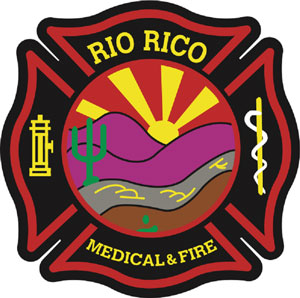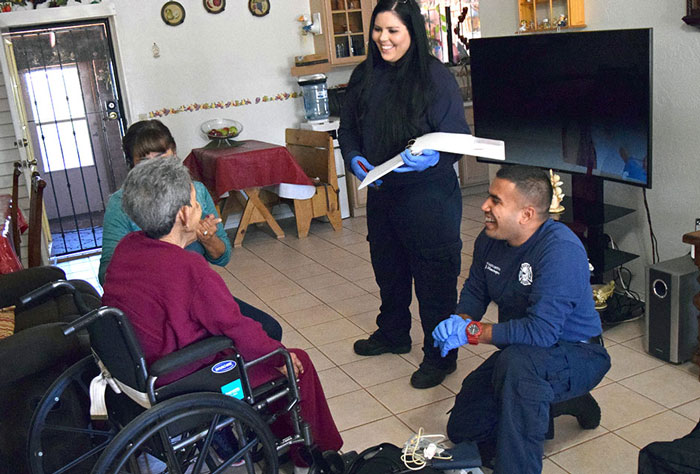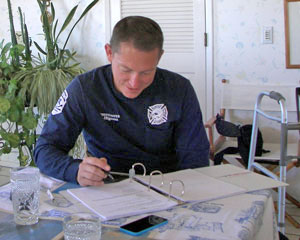Community Healthcare Integrated Paramedicine Program (CHIPP)
- Need: To reduce 911 use and improve older adults' health in rural Santa Cruz County, Arizona.
- Intervention: Community paramedics made scheduled visits to patients and connected them to other community resources.
- Results: CHIPP assisted over 150 people, and 911 calls decreased.
Description
Arizona's rural Santa Cruz County is a Health Professional Shortage Area in primary care. This lack of primary care providers can lead some people to utilize emergency medical services for non-emergencies, which is expensive and might take emergency medical technicians (EMTs) away from other calls.
In addition, many older adults in this county live by themselves and don't have family nearby. Some of these adults have Alzheimer's or other forms of dementia but can't afford memory care or assisted living. Others aren't able to leave the house to buy food or see the doctor.
 To reduce
911 use for non-emergencies and improve older adults'
health, the Rio Rico Medical & Fire District created the
Community Healthcare Integrated Paramedicine Program
(CHIPP), in which firefighters and EMTs received
community paramedicine training and provided in-home
care to older patients.
To reduce
911 use for non-emergencies and improve older adults'
health, the Rio Rico Medical & Fire District created the
Community Healthcare Integrated Paramedicine Program
(CHIPP), in which firefighters and EMTs received
community paramedicine training and provided in-home
care to older patients.
The Rio Rico Medical & Fire District partnered with the Tubac Fire District, Sonoita-Elgin Fire District, Nogales Fire Department, Arizona Poison and Drug Information Center, and healthcare facilities and organizations. The Rio Rico Medical & Fire District received a 2015-2018 Federal Office of Rural Health Policy (FORHP) Rural Health Care Services Outreach Grant to support this program. CHIPP is currently inactive, but program coordinators are looking to relaunch it in 2023.
This KOLD News 13 video contains more information about CHIPP:
Services offered
Clinicians, primary care offices and hospital staff, and home health agencies referred super-utilizing older patients (55 or older) with chronic conditions to CHIPP. Eligible conditions included:
- Alzheimer's or other dementias
- Behavioral health issues
- COPD
- Congestive heart failure
- Diabetes
- Hypertension
- Post-myocardial infarction syndrome
CHIPP paramedics then made scheduled home visits to community members and provided the following free services:
- Checking and tracking of vital signs, like weight and blood sugar
- Chronic disease education
- Delivery of medications
- Home inspections, to check for fall risks and other hazards
- Medication management support
- Referrals to community resources like home repair and social services
All providers were trained in community paramedicine, which taught them to see the larger issue instead of the specific reason a patient called. For example, a patient may call with a specific health concern like anxiety, but the provider notices that the house is unkempt or there are tripping hazards like unsecured rugs. That provider can call CHIPP and get the patient connected with any needed resources or care.
For medication management support, CHIPP partnered with the Arizona Poison and Drug Information Center. CHIPP staff documented their patients' medications and sent the information to the center's pharmacist. The pharmacist reviewed the list and contacted CHIPP with any concerns (for example, if a dosage seems too high or if certain medications will negatively interact with others). CHIPP staff then communicated these concerns to the patient and their primary care provider.
Results
CHIPP assisted over 150 people, and 911 calls decreased.
In addition, Rio Rico Medical & Fire District was recognized as a Treat and Refer provider, which allows EMS staff responding to 911 calls in which patients don't need an ambulance to assess and refer patients to more appropriate care, like urgent care or behavioral health.

Challenges
Resources are available in some communities but not others, which can limit how some residents are helped. For example, public transportation and Meals on Wheels are available in Nogales but not in Rio Rico.
Replication
 Complete a needs
assessment. CHIPP staff completed a formal assessment,
but informal assessments work too. Ask community agencies
and first responders what resources are available and
what services are needed. First responders and 911
operators can also ask patients and other community
members what services they need.
Complete a needs
assessment. CHIPP staff completed a formal assessment,
but informal assessments work too. Ask community agencies
and first responders what resources are available and
what services are needed. First responders and 911
operators can also ask patients and other community
members what services they need.
Network within the county to identify where you can send those residents who need help. Through its grant, CHIPP started a collaborative focus group with other agencies in the county.
Contact Information
Carl Mare', EMS CoordinatorRio Rico Medical and Fire District
CMare@rioricofire.org
Topics
Chronic disease management
Community paramedicine
Elderly population
Emergency medical technicians and paramedics
States served
Arizona
Date added
December 18, 2018
Date updated or reviewed
January 7, 2022
Suggested citation: Rural Health Information Hub, 2022. Community Healthcare Integrated Paramedicine Program (CHIPP) [online]. Rural Health Information Hub. Available at: https://www.ruralhealthinfo.org/project-examples/1047 [Accessed 26 April 2024]
Please contact the models and innovations contact directly for the most complete and current information about this program. Summaries of models and innovations are provided by RHIhub for your convenience. The programs described are not endorsed by RHIhub or by the Federal Office of Rural Health Policy. Each rural community should consider whether a particular project or approach is a good match for their community’s needs and capacity. While it is sometimes possible to adapt program components to match your resources, keep in mind that changes to the program design may impact results.
